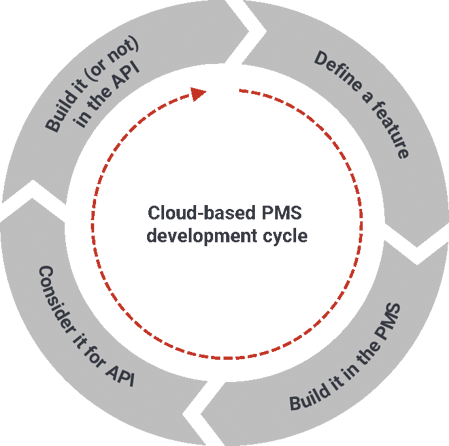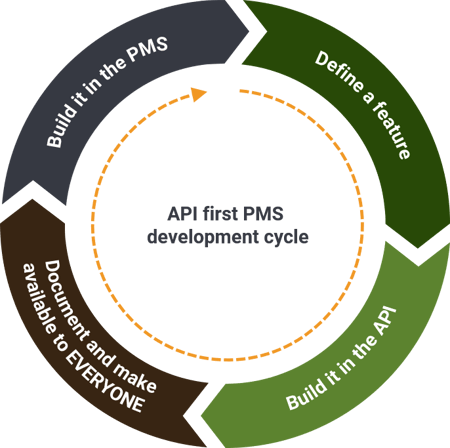Imagine if every time you wanted to install a new app on your smartphone, you had to call the maker of your phone to ask about it, then schedule a date far in the future for one of their representatives to come to your house, get it working on your phone, and charge you heaps of money in the process. You wouldn’t stand for it, right? Then why go through a similar process when working with your property management system (PMS)?
NB: This is an article from Apaleo
Legacy PMSs make it difficult and costly to connect all systems. Even some modern, cloud-based PMSs aren’t developed in a way that makes connectivity as easy and painless as it should be. So how does a PMS make your hotel tech as simple to manage as the apps on your smartphone? It must disrupt. It must rethink the way the entire product is developed. And that begins with an API first approach.
But first, what is an API?
API stands for Application Programming Interface (stay with me here…) and it allows systems to communicate with each other much more intelligently than has ever been possible before. APIs make our lives easier on a daily basis without us even realizing it, from automatically reminding us to complete that travel booking we started earlier to snagging those presale Beyoncé concert tickets to telling your internet browser to show you the news when you want to see what’s going on in the world.
For hotels, well-designed APIs represent a quantum leap forward from older interfacing methods, allowing vendors to connect to other systems with minimal effort, far greater stability and much richer integration, all with the ultimate benefit of vastly improving the guest experience and increasing efficiencies across the business through streamlined processes and automation.
Now that that’s cleared up, how do modern PMSs incorporate APIs into their product development cycle?
Cloud-based PMSs that offer an open API have started to make connectivity easier in the last few years, but still face issues because of the way their systems are built – with the PMS first, then the API later. The development cycle looks like this:

On the surface, it sounds logical. But the API is fundamental to your hotel’s ability to integrate with anything. With the PMS coming first, then the API later (either as an afterthought or as a new revenue stream), you run the risk that the data you need either isn’t available or requires custom developments from your PMS vendor that cost time and money.
The new API first approach
The new approach, which is unique to apaleo, turns things upside down. It starts with the API, then the PMS is built on top of it. Here’s how that product development cycle looks:

By putting the API front and center, the process of connecting any and all systems to your PMS is drastically simplified. It makes automatic interfacing a reality (a couple of clicks, no humans/engineers needed). It enables deeper and more seamless integrations. It simplifies set up and workflows for users. And it radically reduces the effort and time needed to develop the integration in the first place.
When starting with the API first, the PMS can guarantee that everything – every single piece of data – in the PMS is also completely available, accessible and integrate-able. In fact, at apaleo, we even put feature support and documentation in our API first, then connect, just like any other 3rd party system. This ensures that hotels never face a situation where a connected system can’t make use of every single feature in our PMS. And, best of all, this new approach allows PMS vendors to drop all the frustrating costs traditionally associated with integrations (services, support fees, time spent waiting).
With this setup, you can truly build your own ecosystem with a range of awesome applications that integrate seamlessly with all the other systems you’ve specified. It allows you to run your business like a dream and wow your guests. The new, connected world of hotel tech is here, and it all starts with the API. Welcome to the API first future.





